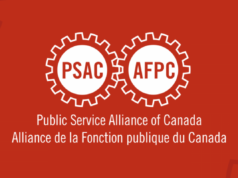Send a letter to Minister Jean-Yves Duclos and Minister Anita Anand that Phoenix damages shouldn’t be taxed.
The Liberal government has shamelessly chosen the 5th anniversary of the Phoenix pay system disaster to short-change thousands of PSAC members on their compensation for years of pay problems.
Even though PSAC is in the process of working with CRA to review the taxability of Phoenix damages, the federal government has confirmed that it intends to ignore these efforts and issue the up to $2,500 for our members, on March 3 – with taxes deducted. Treasury board provided no explanation for their actions.
“The government still has time to do the right thing,” said PSAC National President Chris Aylward. “General damages should not be taxed, so we’re calling on key ministers to immediately intervene to fix this before payments are issued.”
The $2,500 settlement, even if taxed, is still greater than the five days of leave offered to PSAC members, but it represents a violation of the language we negotiated into the agreement. PSAC maintains that general damages paid to all employees for ‘stress, aggravation, pain and suffering’ and for the late implementation of collective agreements are non-taxable, as CRA has acknowledged other specific damages in the settlement should be treated.
“It’s a slap in the face to the tens of thousands of PSAC members who suffered years of pay problems, and then worked non-stop during this pandemic to deliver aid and benefits to millions of Canadians in crisis,” said PSAC National President Chris Aylward.
PSAC will pursue every legal route to secure the full compensation that our members are entitled to. This includes tax challenges that would retroactively see our members reimbursed should the payments be issued as planned on March 3, but our goal remains to avoid any time-consuming and complex tax disputes for our members.
“Phoenix short-changed PSAC members for years – the last thing they deserve is for the government to short-change them again,” added Aylward.
PSAC will continue to work to resolve this problem and updates will follow in the coming days.
The original version of this article was first posted on the PSAC website.





